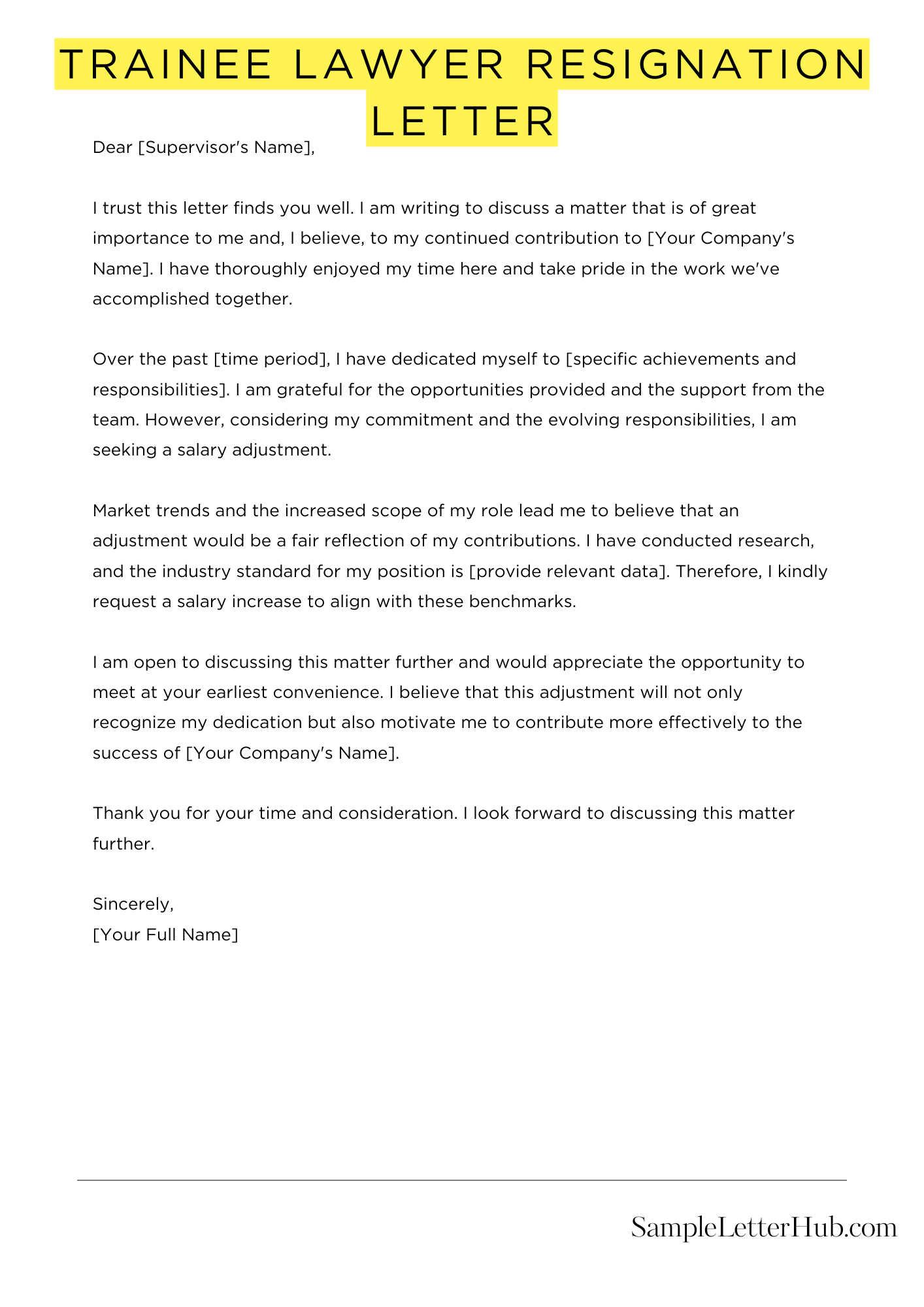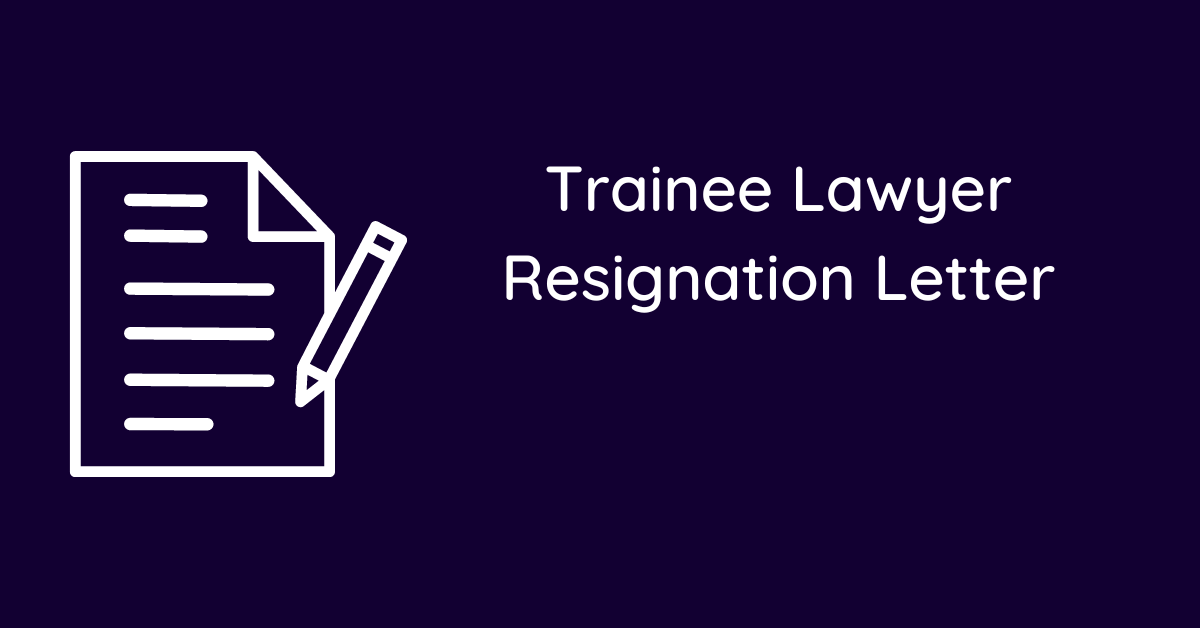Are you a trainee lawyer who’s decided to bid farewell to your current firm? If so, you’ll need to draft a resignation letter that clearly outlines your decision. Don’t worry, we’ve got you covered. Below, we’ll provide you with an example of a trainee lawyer resignation letter that you can use as inspiration.
When crafting your resignation letter, it’s essential to maintain a polite and professional tone throughout. Express your gratitude for the opportunities you’ve been given and highlight the positive experiences you’ve had during your time at the firm. Remember, leaving on good terms can open doors for future collaborations or recommendations.
To help you get started, we’ve included a sample trainee lawyer resignation letter template below. Feel free to adapt it to suit your specific circumstances and preferences. Remember to be clear, concise, and professional in your communication.
Trainee Lawyer Resignation Letter
Dear [Recipient Name],
Please accept this letter as formal notification that I will be resigning from my position as a Trainee Lawyer at [Law Firm Name], effective two weeks from today, [Date].
During my time at the firm, I have gained invaluable experience and knowledge that I will always cherish. I am grateful for the opportunities and support I have received from you and the entire team.
I wish you and the firm all the best in the future.
Sincerely,
[Your Name]
Short Trainee Lawyer Resignation Letter Sample
Please accept this letter as formal notification that I am resigning from my position as Trainee Lawyer at [Company Name]. My last day of employment will be [Your Last Day]. Thank you for the opportunity to grow and learn during my time here. I wish you and the company continued success. I am happy to assist in the transition process to ensure a smooth handover of my responsibilities.
I wish you all the best with your trainee lawyer resignation letter.
When it’s time to say farewell, expressing your gratitude and best wishes can make the transition smoother:

How to Write a Trainee Lawyer Resignation Letter
1. Start with a Formal Salutation
Begin your letter with a formal salutation, such as “Dear [Supervisor’s Name].”
2. Express Your Gratitude
Express your gratitude for the opportunity to work at the firm and the experiences you have gained. Mention specific projects or mentors that have been particularly impactful.
3. State Your Resignation
Clearly state your intention to resign from your position as a trainee lawyer. Include the date on which your resignation will take effect.
4. Offer to Assist with the Transition
Offer to assist with the transition during your notice period. This shows that you are committed to leaving the firm on good terms.
5. Close with a Professional Tone
End your letter with a professional tone, expressing your best wishes for the firm’s future success.
Trainee Lawyer Resignation Letter: Frequently Asked Questions
Leaving a traineeship can be a daunting experience, and it’s important to approach it with professionalism and clarity. Here are six of the most frequently asked questions about writing a trainee lawyer resignation letter, along with their answers:
1. What should I include in my resignation letter?
Your resignation letter should include your name, position, the date you’re resigning, and the date your resignation will take effect. You should also state your reasons for leaving, and express your gratitude for the opportunity to work at the firm.
2. How should I format my resignation letter?
Your resignation letter should be formal and concise. It should be single-spaced, with a one-inch margin on all sides. You should use a professional font, such as Times New Roman or Arial.
3. What should I say in my resignation letter?
In your resignation letter, you should be clear and direct about your decision to leave. You should also be polite and respectful, and thank the firm for the opportunity to work there.
4. How should I handle any outstanding work?
If you have any outstanding work when you resign, you should offer to help with the transition. You can do this by offering to train your replacement, or by providing documentation on your work.
5. What should I do if I’m not sure how to write my resignation letter?
If you’re not sure how to write your resignation letter, you can consult with a career counselor or a lawyer. They can help you draft a letter that is professional and effective.
6. What should I do after I submit my resignation letter?
After you submit your resignation letter, you should meet with your supervisor to discuss your departure. You should also give the firm ample notice, so that they have time to find a replacement.
Before making the decision to resign from your job, it’s essential to consider the legal aspects:
Understanding your emotions after quitting your job is important. Explore why you might be feeling sad:
Related
- Resignation letter sample
- Forced resignation letter
- Resignation letter due to going abroad
- Resignation letter due to marriage
- Resignation letter due to other opportunity
- Resignation letter due to mistake

